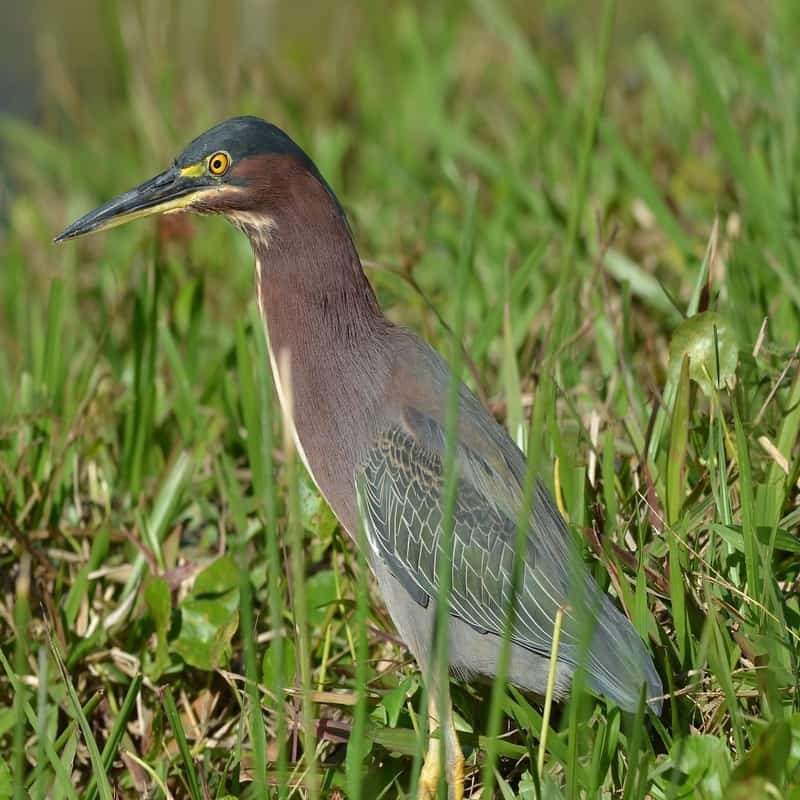Green herons, Butorides virescens are tiny species of heron found in North and Central America. Butorides is derived from the Middle English butor “bittern” and the Ancient Greek -oides, “similar,” while virescens is Latin meaning “greenish.” For a long time, it was thought conspecific with its sister species, the striated heron (Butorides striata), and the two were referred to collectively as the “green-backed heron.”
Quick Overview: Butorides Virescens – Green Heron
Body size: Around 18-22 in (46-56 cm) and a weight of 260 g (9.17 oz)
Main colors: Green-black, Green, Blue, Orange
Range: Throughout the United States
Migratory Bird: Yes
Best time of the year to see in the U.S.: June, July, August, September
Conservation Status: Least Concern
Green Heron Description
Adults have a glossy greenish-black crown and back, black wings with green and/or blue margins, and gray underparts. The bill is dark and has a long, pointed tip, while the legs are orange. Female adults are often smaller and have duller, lighter plumage than males, especially during the breeding season.

Size
These birds have a length of 18-22 in (46-56 cm) and a weight of 260 g (9.17 oz). Their wings could range from 25-26 in (64-66 cm).
Feeding
Green herons are carnivores that feed mostly on fish and invertebrates. They are opportunistic foragers with a diverse prey basis, depending on the species available. They feed on overabundant food sources, such as frog reproduction. Leeches, earthworms, dragonflies, damselflies, waterbugs, grasshoppers, and crayfish comprise their invertebrate diet. Minnows, sunfish, catfish, perch, eels, and, in metropolitan areas, goldfish are among the numerous fish consumed. Additionally, rats, lizards, frogs, tadpoles, and snakes are consumed.
Habitat
Green herons inhabit forested watersheds. Their distribution is constrained by the presence of wetlands. They are found in both salt and fresh water, demonstrating remarkable adaptability in habitat selection. Mangrove-lined coastlines and estuaries, as well as dense, woody vegetation that surrounds ponds, rivers, and lakes, are preferred habitats.
Behavior
Because green herons are secretive birds, they are infrequently observed, despite the fact that they are extremely common. They are active at all hours of the day. They walk slowly and deliberately, and their wingbeats are moderate and steady in flight. They may also swim in pursuit of prey on occasion. Green herons are territorial and will defend their feeding and breeding territory vigorously against conspecifics.
Butorides Virescens Scientific Classification
- Kingdom: Animalia
- Phylum: Chordata
- Subphylum: Chelicerata
- Class: Aves
- Order: Pelecaniformes
- Family: Ardeidae
- Genus: Butorides
- Species: Butorides virescens
Best time of the year to see
The best time to see these birds in the United States is during the summer season (June – September).
Distribution of the Green Heron in the USA
Breeds over the majority of the United States, save eastern Washington, the Dakotas, and northern Utah and Colorado, winters along the West Coast and in the southern United States, south to Venezuela, Panama, and the West Indies.
The Green heron can be found in the following states in the United States – Alabama, Alaska, Arizona, Arkansas, California, Connecticut, Delaware, Florida, Georgia, Hawaii, Illinois, Indiana, Iowa, Kansas, Kentucky, Louisiana, Maine, Maryland, Massachusetts, Michigan, Minnesota, Mississippi, Missouri, Nebraska, Nevada, New Hampshire, New Jersey, New Mexico, New York, North Carolina, North Dakota, Ohio, Oklahoma, Oregon, Pennsylvania, Rhode Island, South Carolina, South Dakota, Tennessee, Texas, Vermont, Virginia, West Virginia, and Wisconsin.
